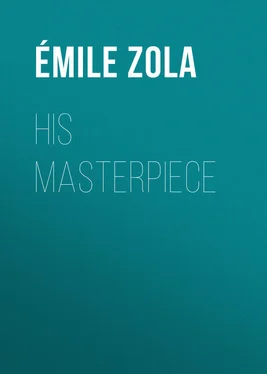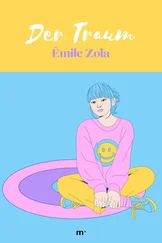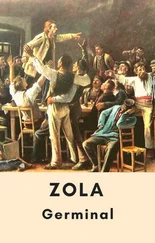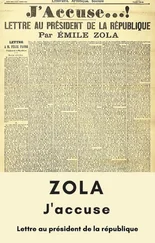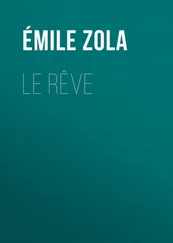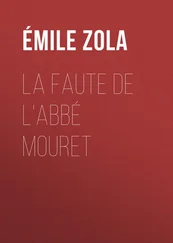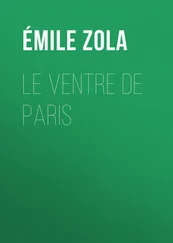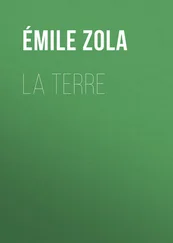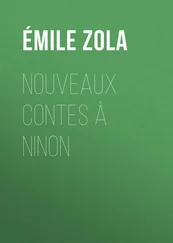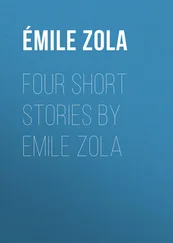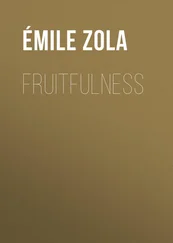Émile Zola - His Masterpiece
Здесь есть возможность читать онлайн «Émile Zola - His Masterpiece» — ознакомительный отрывок электронной книги совершенно бесплатно, а после прочтения отрывка купить полную версию. В некоторых случаях можно слушать аудио, скачать через торрент в формате fb2 и присутствует краткое содержание. Жанр: literature_19, foreign_antique, foreign_prose, на английском языке. Описание произведения, (предисловие) а так же отзывы посетителей доступны на портале библиотеки ЛибКат.
- Название:His Masterpiece
- Автор:
- Жанр:
- Год:неизвестен
- ISBN:нет данных
- Рейтинг книги:5 / 5. Голосов: 1
-
Избранное:Добавить в избранное
- Отзывы:
-
Ваша оценка:
- 100
- 1
- 2
- 3
- 4
- 5
His Masterpiece: краткое содержание, описание и аннотация
Предлагаем к чтению аннотацию, описание, краткое содержание или предисловие (зависит от того, что написал сам автор книги «His Masterpiece»). Если вы не нашли необходимую информацию о книге — напишите в комментариях, мы постараемся отыскать её.
His Masterpiece — читать онлайн ознакомительный отрывок
Ниже представлен текст книги, разбитый по страницам. Система сохранения места последней прочитанной страницы, позволяет с удобством читать онлайн бесплатно книгу «His Masterpiece», без необходимости каждый раз заново искать на чём Вы остановились. Поставьте закладку, и сможете в любой момент перейти на страницу, на которой закончили чтение.
Интервал:
Закладка:
It is quite possible that some readers may not judge Claude Lantier, the ‘hero,’ very favourably; he is like the dog in the fable who forsakes the substance for the shadow; but it should be borne in mind that he is only in part responsible for his actions, for the fatal germ of insanity has been transmitted to him from his great-grandmother. He is, indeed, the son of Gervaise, the heroine of L’Assommoir (‘The Dram Shop’), by her lover Lantier. And Gervaise, it may be remembered, was the daughter of Antoine Macquart (of ‘The Fortune of the Rougons’ and ‘Dr. Pascal’), the latter being the illegitimate son of Adelaide Fouque, from whom sprang the insanity of the Rougon-Macquarts. At the same time, whatever view may be taken of Claude’s artistic theories, whatever interest his ultimate fate may inspire, it cannot be denied that his opinions on painting are very ably expressed, and that his ‘case,’ from a pathological point of view, is diagnosticated by M. Zola with all the skill of a physician. Moreover, there can be but one opinion concerning the helpmate of his life, the poor devoted Christine; and no one possessed of feeling will be able to read the history of little Jacques unmoved.
Stories of artistic life are not as a rule particularly popular with English readers, but this is not surprising when one remembers that those who take a genuine interest in art, in this country, are still a small minority. Quite apart from artistic matters, however, there is, I think, an abundance of human interest in the pages of ‘His Masterpiece,’ and thus I venture to hope that the present version, which I have prepared as carefully as my powers permit, will meet with the favour of those who have supported me, for a good many years now, in my endeavours to make the majority of M. Zola’s works accessible in this country.
E. A. V.MERTON, SURREY.
I
CLAUDE was passing in front of the Hotel de Ville, and the clock was striking two o’clock in the morning when the storm burst forth. He had been roaming forgetfully about the Central Markets, during that burning July night, like a loitering artist enamoured of nocturnal Paris. Suddenly the raindrops came down, so large and thick, that he took to his heels and rushed, wildly bewildered, along the Quai de la Greve. But on reaching the Pont Louis Philippe he pulled up, ragefully breathless; he considered this fear of the rain to be idiotic; and so amid the pitch-like darkness, under the lashing shower which drowned the gas-jets, he crossed the bridge slowly, with his hands dangling by his side.
He had only a few more steps to go. As he was turning on to the Quai Bourbon, on the Isle of St. Louis, a sharp flash of lightning illumined the straight, monotonous line of old houses bordering the narrow road in front of the Seine. It blazed upon the panes of the high, shutterless windows, showing up the melancholy frontages of the old-fashioned dwellings in all their details; here a stone balcony, there the railing of a terrace, and there a garland sculptured on a frieze. The painter had his studio close by, under the eaves of the old Hotel du Martoy, nearly at the corner of the Rue de la Femme-sans-Tete. 3 3 The street of the Headless woman. – ED.
So he went on while the quay, after flashing forth for a moment, relapsed into darkness, and a terrible thunder-clap shook the drowsy quarter.
When Claude, blinded by the rain, got to his door – a low, rounded door, studded with iron – he fumbled for the bell knob, and he was exceedingly surprised – indeed, he started – on finding a living, breathing body huddled against the woodwork. Then, by the light of a second flash, he perceived a tall young girl, dressed in black, and drenched already, who was shivering with fear. When a second thunder-clap had shaken both of them, Claude exclaimed:
‘How you frighten one! Who are you, and what do you want?’
He could no longer see her; he only heard her sob, and stammer:
‘Oh, monsieur, don’t hurt me. It’s the fault of the driver, whom I hired at the station, and who left me at this door, after ill-treating me. Yes, a train ran off the rails, near Nevers. We were four hours late, and a person who was to wait for me had gone. Oh, dear me; I have never been in Paris before, and I don’t know where I am…’
Another blinding flash cut her short, and with dilated eyes she stared, terror-stricken, at that part of the strange capital, that violet-tinted apparition of a fantastic city. The rain had ceased falling. On the opposite bank of the Seine was the Quai des Ormes, with its small grey houses variegated below by the woodwork of their shops and with their irregular roofs boldly outlined above, while the horizon suddenly became clear on the left as far as the blue slate eaves of the Hotel de Ville, and on the right as far as the leaden-hued dome of St. Paul. What startled her most of all, however, was the hollow of the stream, the deep gap in which the Seine flowed, black and turgid, from the heavy piles of the Pont Marie, to the light arches of the new Pont Louis Philippe. Strange masses peopled the river, a sleeping flotilla of small boats and yawls, a floating washhouse, and a dredger moored to the quay. Then, farther down, against the other bank, were lighters, laden with coals, and barges full of mill stone, dominated as it were by the gigantic arm of a steam crane. But, suddenly, everything disappeared again.
Claude had an instinctive distrust of women – that story of an accident, of a belated train and a brutal cabman, seemed to him a ridiculous invention. At the second thunder-clap the girl had shrunk farther still into her corner, absolutely terrified.
‘But you cannot stop here all night,’ he said.
She sobbed still more and stammered, ‘I beseech you, monsieur, take me to Passy. That’s where I was going.’
He shrugged his shoulders. Did she take him for a fool? Mechanically, however, he turned towards the Quai des Celestins, where there was a cabstand. Not the faintest glimmer of a lamp to be seen.
‘To Passy, my dear? Why not to Versailles? Where do you think one can pick up a cab at this time of night, and in such weather?’
Her only answer was a shriek; for a fresh flash of lightning had almost blinded her, and this time the tragic city had seemed to her to be spattered with blood. An immense chasm had been revealed, the two arms of the river stretching far away amidst the lurid flames of a conflagration. The smallest details had appeared: the little closed shutters of the Quai des Ormes, and the two openings of the Rue de la Masure, and the Rue du Paon-Blanc, which made breaks in the line of frontages; then near the Pont Marie one could have counted the leaves on the lofty plane trees, which there form a bouquet of magnificent verdure; while on the other side, beneath the Pont Louis Philippe, at the Mail, the barges, ranged in a quadruple line, had flared with the piles of yellow apples with which they were heavily laden. And there was also the ripple of the water, the high chimney of the floating washhouse, the tightened chain of the dredger, the heaps of sand on the banks, indeed, an extraordinary agglomeration of things, quite a little world filling the great gap which seemed to stretch from one horizon to the other. But the sky became dark again, and the river flowed on, all obscurity, amid the crashing of the thunder.
‘Thank heaven it’s over. Oh, heaven! what’s to become of me?’
Just then the rain began to fall again, so stiffly and impelled by so strong a wind that it swept along the quay with the violence of water escaping through an open lock.
‘Come, let me get in,’ said Claude; ‘I can stand this no longer.’
Both were getting drenched. By the flickering light of the gas lamp at the corner of the Rue de la Femme-sans-Tete the young man could see the water dripping from the girl’s dress, which was clinging to her skin, in the deluge that swept against the door. He was seized with compassion. Had he not once picked up a cur on such a stormy night as this? Yet he felt angry with himself for softening. He never had anything to do with women; he treated them all as if ignorant of their existence, with a painful timidity which he disguised under a mask of bravado. And that girl must really think him a downright fool, to bamboozle him with that story of adventure – only fit for a farce. Nevertheless, he ended by saying, ‘That’s enough. You had better come in out of the wet. You can sleep in my rooms.’
Читать дальшеИнтервал:
Закладка:
Похожие книги на «His Masterpiece»
Представляем Вашему вниманию похожие книги на «His Masterpiece» списком для выбора. Мы отобрали схожую по названию и смыслу литературу в надежде предоставить читателям больше вариантов отыскать новые, интересные, ещё непрочитанные произведения.
Обсуждение, отзывы о книге «His Masterpiece» и просто собственные мнения читателей. Оставьте ваши комментарии, напишите, что Вы думаете о произведении, его смысле или главных героях. Укажите что конкретно понравилось, а что нет, и почему Вы так считаете.
